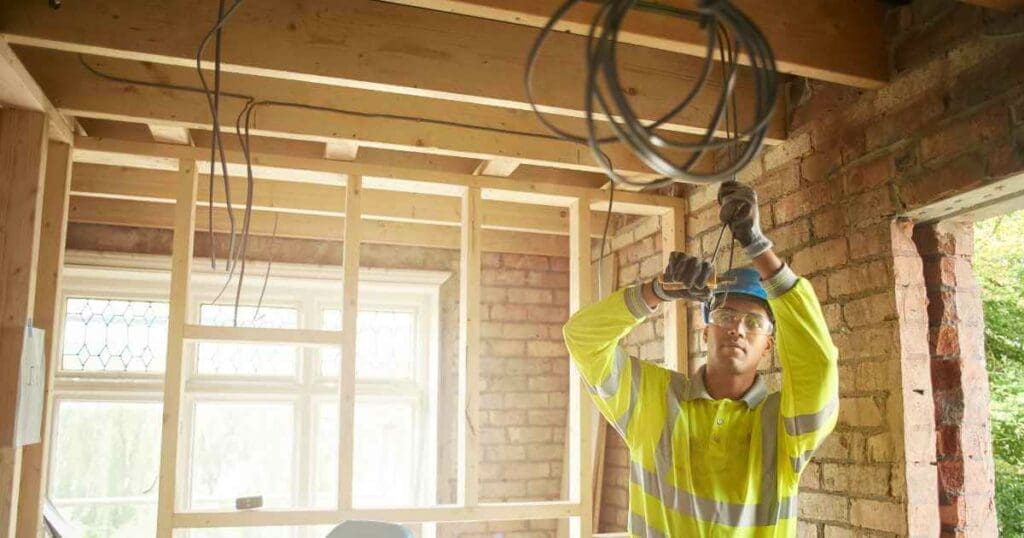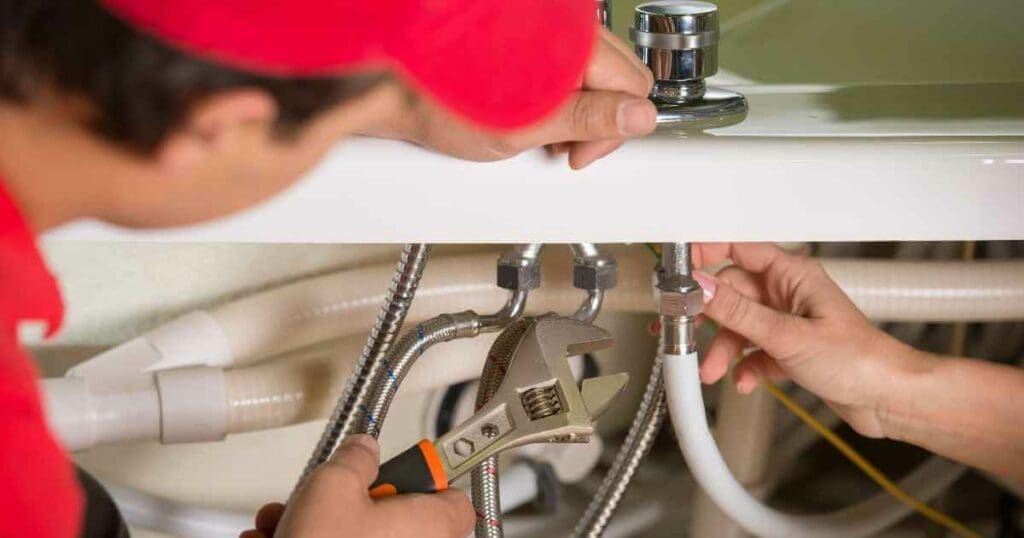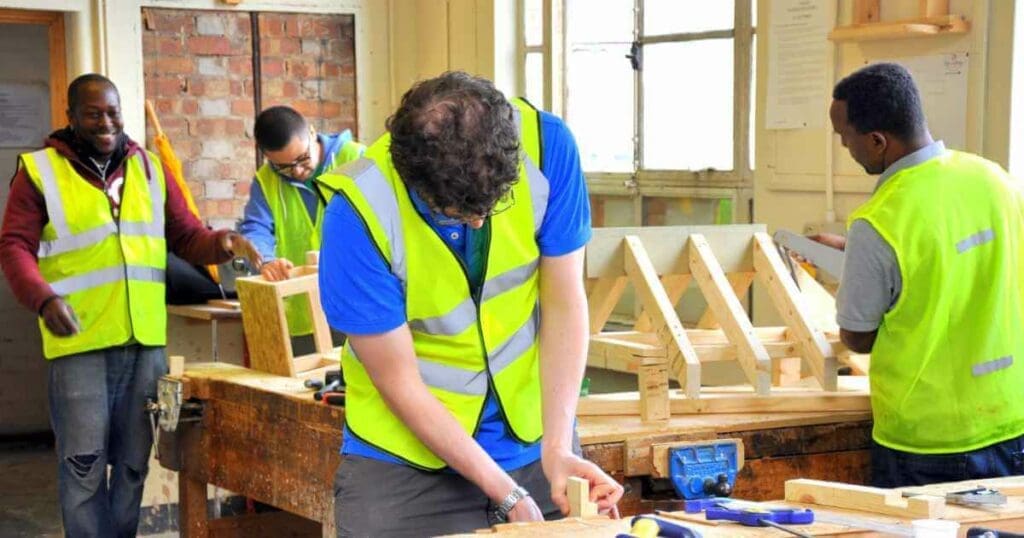Trade schools offer unique opportunities for individuals seeking a rewarding and lucrative career without a traditional four-year college degree. However, many people hesitate to pursue vocational school due to the uncertainty around the program length and commitment required. If you’re reading this, you may wonder, “how long is trade school?” and “what are my options?” This post aims to answer those questions by providing a comprehensive overview of technical school program lengths for some of the most popular trade school programs, including community colleges.
Are you ready to take the next step in your career and start a trade school program but not sure how long it will take to complete? Did you know some vocational programs can be completed in as little as six months? Would one of the many certificate programs be best for you?
Trade schools may not be the traditional route to a successful career, but they offer an alternative path to achieving one’s goals. Trade programs can provide an excellent opportunity for prospective students looking to develop technical skills and pursue entry-level positions in fields such as construction management, all while taking less time than traditional colleges and avoiding the high costs associated with four-year degrees for college students.
At MatchBuilt, we recognize the increasing demand for skilled labor in various industries, including construction. According to a report by the National Association of Home Builders, there is currently a shortage of approximately 500,000 workers in the construction trades in the United States. With this in mind, in this post, we aim to provide you with valuable information on the duration of trade and degree programs for construction managers, electricians, plumbing, welding, HVAC, and carpentry, so that you can make an informed decision about your new career. Before you know it, you could be on a successful career path with other like-minded trade school graduates.
We’ll also provide journeyman information and quotes from industry professionals. Whether you’re a recent high school graduate or an experienced professional looking to switch career paths, this post will provide valuable insights into the length of trade school programs. Let’s dive in and discover how long programs for trade school students really are.
The Length of Trade School Programs: What You Need to Know
Trade school programs can vary in duration depending on the program and school. Some programs can be completed in as little as six months, while others may take two years or more. Factors affecting the duration of trade school programs include program complexity, school schedule, and student progress.
While a longer duration may mean more comprehensive training, it can also come with drawbacks, such as a larger financial investment and a delayed entry into the workforce. On the other hand, a shorter program can mean a quicker entry into the workforce but may not provide as in-depth of a training experience.
Here are five benefits and drawbacks to consider when evaluating the duration of a trade school program:
Benefits:
- More comprehensive training
- Higher likelihood of achieving certification
- Opportunities for hands-on experience and apprenticeships
- Better preparation for the workforce
- Access to a network of industry professionals
Drawbacks:
- Higher financial investment
- Delayed entry into the workforce
- Time away from other commitments such as work or family
- Potentially longer time before seeing a return on investment
- A more rigorous academic schedule
Further, it’s important to do your research and understand the job outlook for the field you’re interested in pursuing. The U.S. Bureau of Labor Statistics (BLS) is a valuable resource for job seekers, providing data on employment trends, average salaries, and job growth projections.
According to the BLS, many trade school careers have a positive job outlook and are projected to grow in the coming years. For example, construction managers are projected to see a 10% increase in employment from 2020 to 2030, and electricians are projected to see an 8% increase in employment during the same time frame. These entry-level positions typically require technical skills that can be gained through vocational or trade school programs, which can be completed in less time than in traditional colleges.
College students and prospective students who are considering a trade school program should take the time to research the BLS data on their desired field to get a sense of the job market and earning potential. By doing so, they can make an informed decision about their career path and increase their chances of finding a rewarding job after completing their program.
How Long Is Trade School For Construction?
Construction trade school programs vary in duration, with some lasting just a few weeks and others taking over a year to complete. These career-focused training programs prepare students for careers in various construction-related fields, such as carpentry, electrical work, and plumbing. Some trade schools that offer construction programs include:
- Associated Builders and Contractors (ABC) – Offers apprenticeship programs for carpentry, electrical, plumbing, and HVAC trades. The length of the program varies by trade and can take up to four years to complete.
- Home Builders Institute (HBI) – Offers pre-apprenticeship training programs lasting 8-12 weeks for various construction trades.
- National Technical Institute for the Deaf (NTID) – Offers a Construction Trades Certificate program that can take up to 16 months to complete.
How long is construction trade school?
Construction trade school programs can range from just a few weeks to over a year in duration.
While trade school programs can provide students with valuable knowledge and skills, many construction trades require additional experience and certification to become a journeyman. Journeymen are experienced professionals who have completed an apprenticeship program and have been certified in their field. Some trades requiring journeyman/apprenticeship experience and trade school include electricians, plumbers, and carpenters. This experience typically involves several years working in the industry and completing a state-approved apprenticeship program. By completing an apprenticeship program and obtaining journeyman status, individuals can increase their job opportunities and earning potential in the construction trades.
According to a representative from the Home Builders Institute:
Trade schools offer an accelerated pathway to a career in construction. Our programs provide hands-on training and real-world experience that can prepare students for a fulfilling and lucrative career in the construction industry.
With the construction industry expected to grow, trade school programs can offer a viable option for those interested in this field.
How Long Is Trade School for an Electrician?
Attending an electrician trade school program is an excellent way to gain the skills and knowledge necessary to succeed in this high-demand field. However, it is essential to note that other journeyman/apprenticeship experience is required to become a licensed electrician. If you want to pursue a career as an electrician, consider attending a trade school program and researching apprenticeship opportunities in your area.
How Long is Electrician Trade School?
Electrician trade school programs can vary in duration, depending on the type of program and the level of education you want to achieve. Some programs can be completed in as little as nine months, while others can take up to four years. For example, an electrical technology certificate program typically takes 9-12 months, while an associate degree program can take up to two years. A bachelor’s degree program in electrical engineering can take up to four years.
Journeyman/Apprenticeship Experience
While attending a trade school program is a great way to gain knowledge and skills, becoming an electrician is not the only requirement. Many states require individuals to have a certain amount of journeyman/apprenticeship experience before becoming licensed electricians. This experience typically involves several years working in the industry and completing a state-approved apprenticeship program. Electricians must pass an exam that tests their knowledge of electrical theory, codes, and regulations to obtain a license.
Levels of Electricians
There are typically three levels of electricians in the electrical trade: apprentice, journeyman, and master electrician. Apprentices are individuals who are just starting their careers in the electrical trade and are working to gain experience and knowledge. Journeymen have completed an apprenticeship program and have been certified in their field. They can work independently and supervise apprentices. Master electricians are experienced professionals who have completed additional training and have passed a licensing exam. They can design, install, and maintain electrical systems.
Electrician Trade School by State
To help you get started, we have created a table of electrician trade schools in each state. This table provides information on the name of the school, the type of program offered, and the program length. Check out the table below for an electrician trade school program in your state.
| State | Electrician Trade School | Duration (months) | Link |
|---|---|---|---|
| Alabama | Calhoun Community College | 12 | Link |
| Alaska | University of Alaska Anchorage | 12 | Link |
| Arizona | GateWay Community College | 12 | Link |
| Arkansas | Arkansas State University Newport | 12 | Link |
| California | Los Angeles Trade Technical College | 24 | Link |
| Colorado | Emily Griffith Technical College | 24 | Link |
| Connecticut | Porter and Chester Institute | 12 | Link |
| Delaware | Delaware Technical Community College | 12 | Link |
| Florida | Pinellas Technical College | 36 | Link |
| Georgia | Atlanta Technical College | 12 | Link |
| Hawaii | Honolulu Community College | 12 | Link |
| Idaho | College of Western Idaho | 24 | Link |
| Illinois | Fox Valley Technical College | 24 | Link |
| Indiana | Ivy Tech Community College | 36 | Link |
| Iowa | Hawkeye Community College | 12 | Link |
| Kansas | Wichita Area Technical College | 24 | Link |
| Kentucky | Elizabethtown Community and Technical College | 12 | Link |
| Louisiana | Louisiana Technical College | 24 | Link |
| Maine | Kennebec Valley Community College | 12 | Link |
| Maryland | Montgomery College | 36 | Link |
| Massachusetts | Benjamin Franklin Institute of Technology | 24 | Link |
| Michigan | Grand Rapids Community College | 36 | Link |
| Nebraska | Metropolitan Community College | 12 | Link |
| Nevada | College of Southern Nevada | 36 | Link |
| New Hampshire | Manchester Community College | 12 | Link |
| New Jersey | Bergen Community College | 12 | Link |
| New Mexico | Central New Mexico Community College | 12 | Link |
| New York | Hudson Valley Community College | 24 | Link |
| North Carolina | Forsyth Technical Community College | 12 | Link |
| North Dakota | Bismarck State College | 48 | Link |
| Ohio | Columbus State Community College | 36 | Link |
| Oklahoma | Tulsa Technology Center | 36 | Link |
| Oregon | Rogue Community College | 36 | Link |
| Pennsylvania | Reading Area Community College | 24 | Link |
| Rhode Island | New England Institute of Technology | 24 | Link |
| South Carolina | Trident Technical College | 12 | Link |
| South Dakota | Lake Area Technical Institute | 24 | Link |
| Tennessee | Tennessee College of Applied Technology | 12 | Link |
| Texas | San Jacinto College | 36 | Link |
| Utah | Salt Lake Community College | 36 | Link |
| Vermont | Vermont Technical College | 12 | Link |
| Virginia | Northern Virginia Community College | 24 | Link |
| Washington | Renton Technical College | 24 | Link |
| West Virginia | Ben Franklin Career Center | 12 | Link |
| Wisconsin | Waukesha County Technical College | 24 | Lin |
| Wyoming | Casper College | 36 | Link |
More resources that may help you find the information you’re looking for:
- The National Electrical Contractors Association (NECA) maintains a directory of electrical training centers in the United States. You can search by state to find a school near you.
- The Independent Electrical Contractors (IEC) also maintains a directory of electrical trade schools across the United States.
- The National Joint Apprenticeship and Training Committee (NJATC) offers a five-year apprenticeship program for aspiring electricians. The program includes on-the-job training as well as classroom instruction.
- The Associated Builders and Contractors (ABC) offer electrical apprenticeship training programs in many states. They also provide online courses for individuals interested in becoming electricians.
As Lee Colaw, Electrical Program Manager at Tulsa Welding School, says,
The Electrical Applications program at Tulsa Welding School provides students with the hands-on experience and training needed to become successful electricians. Our program is designed to provide a comprehensive education in electrical theory and practical skills, preparing our students for various entry-level electrical positions.
How Long Is Plumbing Trade School?
Plumbing is a crucial component of any building, making it a vital trade in the construction industry. Plumbers install and repair piping systems that carry water, gas, and waste, ensuring that buildings have functional plumbing systems. With the high demand for skilled plumbers, trade schools are an excellent option for those who want to pursue a career in plumbing.
How long is plumbing trade school?
Plumbing trade school programs can vary in duration, depending on the type of program and the school. Some programs can be completed in just a few months, while others may take several years to finish. However, most plumbing trade school programs typically take about 1-2 years to complete.
Journeyman/Apprenticeship Experience
Becoming a licensed plumber typically requires completing an apprenticeship program and obtaining a state license. During the apprenticeship, aspiring plumbers work alongside experienced professionals to learn the skills necessary for the trade. Apprenticeships, including on-the-job training and classroom instruction, can take up to five years to complete.
Many states require plumbers to obtain a license or certification to work independently. Licensing requirements can vary depending on the state, but they typically require passing an exam and fulfilling other state-specific requirements.
Levels of Plumbers
There are three levels of plumbing professionals: apprentice plumbers, journeyman plumbers, and master plumbers. Apprentice plumbers are new to the trade and work alongside journeyman and master plumbers to learn the skills necessary for the trade. Journeyman plumbers have completed their apprenticeship and can work independently, while master plumbers have extensive experience and can design and oversee plumbing projects.
Plumbing Trade School by State
With the high demand for skilled plumbers and the various opportunities for career advancement, pursuing a career in plumbing can be an excellent option. Consider enrolling in a plumbing trade school to begin your journey toward becoming a licensed plumber.
If you are interested in pursuing a career in plumbing, many trade schools nationwide offer plumbing programs. In the table below, you can find a plumbing trade school in each state.
| State | School | Duration (months) | Link |
|---|---|---|---|
| Alabama | Bishop State Community College | 12-18 | Link |
| Alaska | Alaska Vocational Technical Center | 7 | Link |
| Arizona | RSI Refrigeration School | 9 | Link |
| Arkansas | Arkansas Construction Education Foundation | 12 | Link |
| California | Associated Builders and Contractors of Northern California | 60 | Link |
| Colorado | Emily Griffith Technical College | 8-12 | Link |
| Connecticut | Porter and Chester Institute | 12-13 | Link |
| Delaware | Delaware Skills Center | 11-12 | Link |
| Florida | Florida Career College | 10-12 | Link |
| Georgia | Georgia Northwestern Technical College | 12 | Link |
| Hawaii | Hawaii Community College | 12 | Link |
| Idaho | College of Western Idaho | 8-12 | Link |
| Illinois | Associated Builders and Contractors of Illinois | 48 | Link |
| Indiana | Ivy Tech Community College | 11-16 | Link |
| Iowa | Des Moines Area Community College | 12 | Link |
| Kansas | North Central Kansas Technical College | 12 | Link |
| Kentucky | Jefferson Community and Technical College | 12 | Link |
| Louisiana | Louisiana Technical College | 12 | Link |
| Maine | Maine Vocational and Technical College | 12 | Link |
| Maryland | Associated Builders and Contractors of Baltimore | Varies | Link |
| Massachusetts | Benjamin Franklin Institute of Technology | 21 | Link |
| Michigan | Washtenaw Community College | 12 | Link |
| Minnesota | Dunwoody College of Technology | 12 | Link |
| Mississippi | Mississippi Gulf Coast Community College | 12 | Link |
| Missouri | State Technical College of Missouri | 12 | Link |
| Montana | Helena College University of Montana | 9 | Link |
| Nebraska | Metropolitan Community College | 9 | Link |
| Nevada | College of Southern Nevada | 12 | Link |
| New Hampshire | Granite State Trade School | 12 | Link |
| New Jersey | Pennco Tech | 10 | Link |
| New Mexico | Northern New Mexico College | 10 | Link |
| New York | New York City College of Technology | 12 | Link |
| North Carolina | Wake Technical Community College | 18 | Link |
| North Dakota | Bismarck State College | 24 | Link |
| Ohio | Great Oaks Career Campuses | 11 | Link |
| Oklahoma | Oklahoma State University Institute of Technology | 12 | Link |
| Oregon | Oregon Tradeswomen, Inc. | 7 | Link |
| Pennsylvania | Plumbing Trade School | 6 | Link |
| Rhode Island | New England Institute of Technology | 18 | Link |
| South Carolina | Midlands Technical College | 6 | Link |
| South Dakota | Southeast Technical Institute | 10 | Link |
| Tennessee | Tennessee College of Applied Technology | 12 | Link |
| Texas | San Jacinto College | 12 | Link |
| Utah | Ogden-Weber Technical College | 12 | Link |
| Vermont | Vermont Technical College | 21 | Link |
| Virginia | Northern Virginia Community College | 11 | Link |
| Washington | Perry Technical Institute | 12 | Link |
| West Virginia | Carver Career and Technical Education Center | 12 | Link |
| Wisconsin | Milwaukee Area Technical College | 9 | Link |
| Wyoming | Sheridan College | 12 | Link |
How Long is HVAC Trade School?
HVAC technicians install, repair, and maintain heating, ventilation, and air conditioning systems in residential, commercial, and industrial buildings. With the high demand for skilled HVAC technicians, trade schools are an excellent option for those wanting to pursue an HVAC industry career.
How long is HVAC trade school?
HVAC trade school programs can vary in duration, depending on the type of program and the school. Some programs can be completed in just a few months, while others may take up to two years to complete. However, most HVAC trade school programs typically take around six months to a year to finish.
Journeyman/Apprenticeship Experience
Becoming an HVAC technician typically requires completing an apprenticeship program and obtaining a state license. During the apprenticeship, aspiring HVAC technicians work alongside experienced professionals to learn the skills necessary for the trade. Apprenticeships, including on-the-job training and classroom instruction, can take up to five years to complete.
Many states require HVAC technicians to obtain a license or certification to work independently. Licensing requirements can vary depending on the state, but they typically require passing an exam and fulfilling other state-specific requirements.
Levels of HVAC Technicians
There are three levels of HVAC technicians: apprentice, journeyman, and master HVAC technicians. Apprentice HVAC technicians are new to the trade and work alongside journeyman and master HVAC technicians to learn the skills necessary for the trade. Journeyman HVAC technicians have completed their apprenticeship and can work independently, while master HVAC technicians have extensive experience and can oversee complex HVAC projects.
Pursuing a career in the HVAC industry can be a rewarding and lucrative option. With the high demand for skilled HVAC technicians, there are many opportunities for career advancement and job security. If you are interested in getting involved with the trade, consider enrolling in an HVAC trade school to kickstart your career as an HVAC technician.
How Long Is Trade School For Carpentry?
Carpentry is a skilled trade that involves constructing, installing, and repairing structures and fixtures made of wood. Carpenters work on various projects, including building homes, installing cabinets and furniture, and constructing bridges and highways. With the increasing demand for new construction and remodeling projects, there will always be a high demand for skilled carpenters.
How long is a trade school for carpentry?
The duration of a carpentry trade school program can vary depending on the program’s level and type. Some programs may be completed in as little as six months, while others can take up to two years to complete. In addition to trade school education, carpentry apprenticeships may also be required to gain practical, on-the-job experience. A carpentry apprenticeship usually lasts four years, during which apprentices work alongside experienced carpenters to learn the trade.
Journeyman/Apprenticeship Experience
Like other skilled trades, carpentry requires certification or licensing in some states. The requirements vary by state, but most states require a certification or license to work as a carpenter. Carpenters may need to pass an exam to become licensed, and some states may also require continuing education courses to maintain the license.
Levels of Carpenters
There are different levels of carpentry expertise, including apprentice, journeyman, and master carpenter. An apprentice carpenter is an entry-level position where you learn the basics of the trade through on-the-job training or a trade school program. Once you have completed an apprenticeship and gained enough experience, you can become a journeyman carpenter. Journeyman carpenters are skilled professionals who can work independently and supervise others. Master carpenters are those who have reached the highest level of expertise in the trade.
If you enjoy working with your hands, have an eye for detail, and enjoy building things, carpentry might be your right career path. With the high demand for skilled carpenters, there are plenty of opportunities to start a rewarding career in the trade. If you’re interested in getting involved with carpentry, research trade schools in your area and consider pursuing an apprenticeship to gain valuable experience.
How Long Is Trade School for Welding?
Welding is a skilled trade that involves joining metals together using heat, pressure, or both. Welders work in various industries, including construction, manufacturing, and repair. With the high demand for infrastructure, construction, and transportation, the need for skilled welders will continue to be in high demand.
How long is a trade school for welding?
Welding trade school programs can vary in duration, ranging from several weeks to several months, depending on the specific program and the certification level you seek. Some welding programs may also include an apprenticeship or on-the-job training component. During an apprenticeship, you’ll work alongside experienced welders to learn the practical skills necessary to become a skilled welder.
Journeyman/Apprenticeship Experience
While a certificate or diploma from a welding trade school can help you get started in the field, becoming a licensed welder may require additional training and experience. Welders typically need to be certified in the specific types of welding they’ll be performing, and certification requirements can vary by state. In addition to passing a written exam, welders may also need to complete a certain number of hours of welding experience and provide proof of their skills through welding tests.
Levels of Welding
There are several levels of welding certification, including entry-level, intermediate, and advanced certifications. Entry-level certifications typically require a basic understanding of welding safety, equipment, and techniques. Intermediate certifications may require more advanced knowledge of welding processes, materials, and equipment. Advanced certifications typically require extensive experience and expertise in a particular type of welding, such as underwater welding or welding for aerospace applications.
In conclusion, a career in welding can be both rewarding and lucrative. With high demand and job opportunities in various industries, welding can be a great career choice for those interested in metalworking and fabrication. If you’re interested in pursuing a career in welding, research trade schools and apprenticeship programs in your area, and consider contacting local industry organizations for guidance and support.
Frequently Asked Questions About Skilled Trades Programs
If you are considering pursuing a skilled trades program, you may have questions about what to expect, how to choose a program, and what career opportunities are available. This FAQ section aims to answer some of the most common questions about skilled trades programs to help you decide about your education and career goals.
Admission requirements may vary by program, but most trade schools require a high school diploma or equivalent, and some may require certain prerequisite courses or certifications.
Yes, there are online trade school programs available for these trades. However, hands-on experience is typically necessary; online programs may require in-person lab sessions.
Becoming licensed without attending trade school is possible, but most states require a combination of apprenticeship experience and classroom education. Trade schools can provide a streamlined path to obtaining the necessary knowledge and skills.
Some trades, such as electricians, may have different levels of a journeyman or master certifications based on experience and skill level. HVAC technicians, welders, and plumbers may also have varying levels of certifications.
Apprenticeship programs can vary in length, but they typically last 3-5 years for most trades.
Yes, there are specific certifications for different types of welding techniques. Welders may need to obtain certifications for specific welding processes or materials.
Yes, many trade schools offer job placement assistance to graduates. Some schools may have partnerships with employers or offer career counseling services.
No, trade school programs for these trades are available in many states across the United States.
It may be possible to work in these trades while attending trade school, especially if you are already working as an apprentice or have some experience. However, it is important to balance work and school responsibilities and ensure that your employer supports your education goals.
Yes, some states may require additional certifications or licenses for certain types of work, such as electrical contractors or master plumbers. Researching the requirements in your state and consulting with a licensing board or professional association is important.
Construction trade school programs vary in duration, with some lasting just a few weeks and others taking over a year to complete.
Some programs can be completed in as little as nine months, while others can take up to four years. For example, an electrical technology certificate program typically takes 9-12 months, while an associate degree program can take up to two years.
Some programs can be completed in just a few months, while others may take several years to finish. However, most plumbing trade school programs typically take about 1-2 years to complete.
Some programs can be completed in just a few months, while others may take up to two years to complete. However, most HVAC trade school programs typically take around six months to a year to finish.
Some programs may be completed in as little as six months, while others can take up to two years to complete. In addition to trade school education, carpentry apprenticeships may also be required to gain practical, on-the-job experience.
A New Beginning: Start Your Trade School Journey Today
Trade schools offer a fantastic opportunity to achieve a rewarding and successful career without a traditional four-year college degree. With the high demand for skilled labor across various industries, trade school programs in construction, welding, plumbing, HVAC, and carpentry can provide the training needed to meet this demand.
At MatchBuilt, we understand the value of skilled labor and are committed to helping individuals find the right career path. Our experience in the construction industry has given us a unique perspective on the importance of trade schools in developing a skilled workforce.
If you’re considering a trade school program, don’t let the uncertainty of program length hold you back. Our comprehensive overview of the duration of popular trade school programs, including journeyman and apprentice information, can help you make an informed decision about your future career.
We encourage you to take the next step towards achieving your career goals by exploring the available trade school programs. Whether you’re a recent high school graduate or a seasoned professional looking for a career change, there’s a trade school program that can help you achieve success. Thank you for considering MatchBuilt as your resource for valuable insights into the world of skilled labor.





